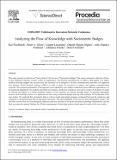| dc.contributor.author | Fischbach, Kai | |
| dc.contributor.author | Gloor, Peter A. | |
| dc.contributor.author | Lassenius, Casper | |
| dc.contributor.author | Olguin Olguin, Daniel | |
| dc.contributor.author | Pentland, Alex Paul | |
| dc.contributor.author | Putzke, Johannes | |
| dc.contributor.author | Schoder, Detlef | |
| dc.date.accessioned | 2020-06-02T12:45:08Z | |
| dc.date.available | 2020-06-02T12:45:08Z | |
| dc.date.issued | 2010-06 | |
| dc.identifier.issn | 1877-0428 | |
| dc.identifier.uri | https://hdl.handle.net/1721.1/125603 | |
| dc.description.abstract | This paper presents a collection of "best practices" for the use of "Sociometric Badges" that support automatic collection of face-to-face interaction between workers within an organization. The practices presented aim to improve data quality over legacy methods allowing insights into the processes and structures of an enterprise's de-facto communication networks. Our approach uses dynamic Social Network Analysis (dSNA) to make it easier for executives to analyze and manage communications networks. The practical applicability of the approach was evaluated by case studies conducted in three different organizations: (1) the marketing department of a medium sized bank in Germany, (2) the post-anesthesia care unit at a large US hospital, (3) teams of software developers in a Nordic European country. For the analysis, we tracked, amongst others, all personal interactions between the knowledge workers in a department or team using sociometric badges worn by each employee for the duration of the case studies. We analyzed this sociometric data as well as emails and instant messages exchanged between the employees and compared it with performance data of individuals and teams. The paper highlights 16 key lessons learnt during these studies. The first nine lessons focus on overcoming the employee's privacy concerns to set up the necessary technology infrastructure, and the final seven provide general findings for efficient management of knowledge workers based upon the results of the case studies. Keywords: sociometric badges; social network analysis; knowledge flow optimization | en_US |
| dc.language.iso | en | |
| dc.publisher | Elsevier BV | en_US |
| dc.relation.isversionof | https://dx.doi.org/10.1016/j.sbspro.2010.04.048 | en_US |
| dc.rights | Creative Commons Attribution-NonCommercial-NoDerivs License | en_US |
| dc.rights.uri | http://creativecommons.org/licenses/by-nc-nd/4.0/ | en_US |
| dc.source | Elsevier | en_US |
| dc.title | Analyzing the Flow of Knowledge with Sociometric Badges | en_US |
| dc.type | Article | en_US |
| dc.identifier.citation | Fischbach, Kai et al. "Analyzing the Flow of Knowledge with Sociometric Badges." Procedia - Social and Behavioral Sciences 2, 4 (June 2010): 6389-6397 ©2010 Elsevier Ltd. | en_US |
| dc.contributor.department | Sloan School of Management | en_US |
| dc.contributor.department | Program in Media Arts and Sciences (Massachusetts Institute of Technology) | en_US |
| dc.relation.journal | Procedia - Social and Behavioral Sciences | en_US |
| dc.eprint.version | Final published version | en_US |
| dc.type.uri | http://purl.org/eprint/type/JournalArticle | en_US |
| eprint.status | http://purl.org/eprint/status/PeerReviewed | en_US |
| dc.date.updated | 2019-07-26T11:52:20Z | |
| dspace.date.submission | 2019-07-26T11:52:23Z | |
| mit.journal.volume | 2 | en_US |
| mit.journal.issue | 4 | en_US |
| mit.metadata.status | Complete | |

